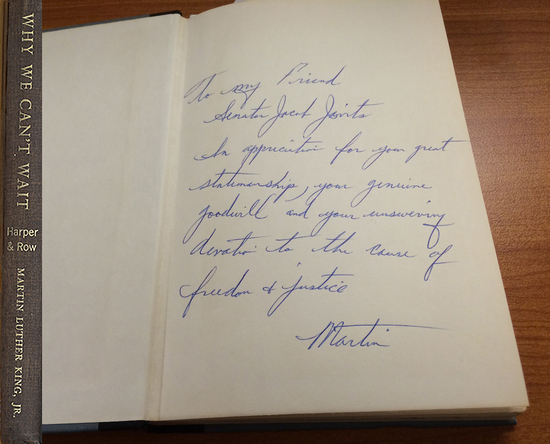
One of my most prized possessions is a book written by Dr. Martin Luther King, Jr. in 1963 called Why We Can't Wait. I treasure it for two reasons -- first because it has a beautiful inscription signed simply "Martin" to my father, New York Senator Jacob Javits, who worked with Dr. King to pass the landmark civil rights legislation soon to follow; and second because it is full of hard-earned lessons that are timelessly relevant to anyone interested in how to create change within a democracy. And the lessons are more urgently needed than ever.
Despite the many victories, the battle started then is unfinished today. Just to name a few of the most pressing issues that Dr. King surely would have been deeply engaged with -- the public outpouring into the streets about the relationship between police and communities of color (the Black Lives Matter campaign), and demonstrations in the aftermath of the killings in Paris.
And we continue to struggle with the economic inequities that Dr. King identified toward the end of his life as the most central issue of all. We have the lowest percentage of working age adults in the workforce in several years; an unemployment rate for African-Americans that has been at least double that of whites for as long as unemployment has been measured; the enormous size and cost of the prison population; and other daunting problems like education and immigration.
While Dr. King expressed impatience with those cautioning against pushing too hard for change, in this book he also analyzed the tactics and strategies of the civil rights movement itself. Dr. King first and foremost counseled that we act, and act now! But what are the most useful lessons we can take from his leadership?
No. 1: The movement did not just deploy a single tactic, but combined grassroots mobilization and court challenges with a legislative strategy meant to achieve specific changes in the laws of the land. Today we have seen this same combination of tactics from the Tea Party to the gay marriage movement, immigration reform and the environment.
•It combined the discipline to resist superficial change with the flexibility to compromise.
•It deliberately connected pressure from demonstrations with an "inside" strategy aimed at legislative and legal reform.
•Those at the grassroots were willing to shoulder great personal sacrifice to demonstrate injustice -- particularly evidenced by the violent police response in the face of non-violent protest -- which embarrassed the country's leaders, and moved Americans to demand action; while also trusting the movement's leaders to negotiate change on their behalf.
No. 2: Dr. King focused on the toughest challenges and the biggest gaps -- the men and women whose lives were the most difficult and who faced the highest barriers. He said, "So often we overlook the worth and significance of those who are not in professional jobs, or those who are not in the so-called big jobs. But let me say to you tonight, that whenever you are engaged in work that serves humanity, and is for the building of humanity, it has dignity, and it has worth. One day our society must come to see this. One day our society will come to respect the sanitation worker if it is to survive. For the person who picks up our garbage, in the final analysis, is as significant as the physician. All labor has worth."
No. 3: Dr. King brought a moral and human dimension to everything he did. He acknowledged the need to try, and the need to learn. "Human beings with all their faults and strengths constitute the mechanism of a social movement... They must make mistakes and learn from them, make more mistakes and learn anew."
Every volunteer of the Birmingham, Ala. movement was required to sign a pledge that included statements like: "Sacrifice personal wishes in order that all men might be free; observe with both friend and foe the ordinary rules of courtesy." He encouraged people to focus on the goal, not their personal needs and interests.
And perhaps most compelling of all, he encouraged respect for "friend and foe." This was not meant to politely accede to inaction. Instead, flowing from that sense of respect, Dr. King forcefully demanded that "friend and foe" get engaged. He challenged us to examine our values and morality and sense of justice, and take action. He drove home our shared responsibility no matter what our role in society -- philanthropy, government or business -- no matter our economic status.
No. 4: Dr. King knew that it is not easy to raise the hard issues and force the attention of the majority who prefer to go about daily life with as little distress as possible. He knew that it was essential to take the enormous risks required to move people sufficiently so they would push the levers of democracy -- engage in debate, identify what we can agree on, and take them to fruition. He noted that, "we who engage in nonviolent direct action are not the creators of tension. We merely bring to the surface the hidden tension that is already alive."
These lessons are drawn from our own history. We celebrate their crucible and leader today. But there are burning issues yet to be dealt with. We have made tremendous leaps forward before, and if we have the nerve and mutual respect to engage and act -- we can make progress again on the urgent matters we face today -- with economic inequity as the centerpiece.
Quotes are from Dr. King's book "Why We Can't Wait" unless otherwise cited.

